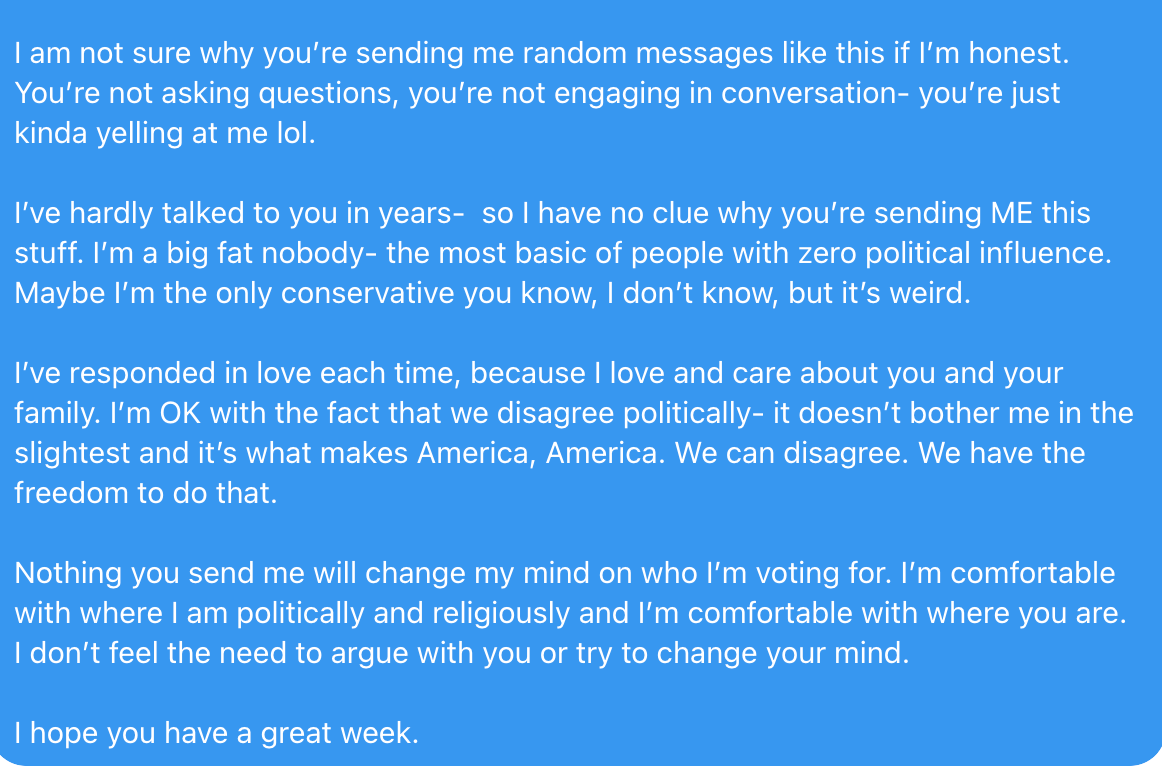As Christians, we're called to speak the truth in love, a command that often places us at the intersection of conviction and compassion. Over the past eight years, I've found myself navigating an increasingly challenging landscape where expressing my faith-based beliefs has led to unexpected consequences. This journey has taught me valuable lessons about the nature of modern discourse, the importance of standing firm in one's convictions, and the delicate balance of speaking truth while showing love.
In recent years, I've encountered a form of opposition that I can only describe as subtle bullying. It's not the overt hostility or aggression that we might typically associate with bullying. Instead, it's a more nuanced form of pressure – a quiet but persistent push to silence beliefs that don't align with popular opinion.
This subtle bullying can take many forms. For instance, a friend once informed me that she would no longer follow me on social media because she found my opinions "hateful." While she's entitled to her view, this labeling of differing opinions as "hate" creates a chilling effect on open dialogue.
In another instance, an acquaintance I barely knew bombarded me with messages criticizing my beliefs, going so far as to say, "not everyone that disagrees with you is the devil" – an accusation I had never made or implied. When I responded with kindness, wishing her and her family well, she mocked my expression of care.
Below is this strange exchange. You can see she just sent a meme of sorts- that's the first message she has ever sent me. She's never commented on posts, in fact I didn't even know we were connect on social media. Our children were friends when we lived in a different state almost 12 years ago.
When she shared the first meme, you can see how I responded- I agreed! That meme had a solid point about the double standard of men and women, especially in politics. I then tried to reel it in and move on. Well, that didn't help.
You can see the exchange below:






So again- this isn't what you would think of in regards to bullying, but it's subtle. And yes, it's bullying.
Why is it acceptable for others to criticize my beliefs unsolicited, but when I express my views, it's labeled as hate?
How can someone claim to oppose intolerance while simultaneously being intolerant of differing opinions?
If diversity and inclusion are truly valued, shouldn't that extend to diversity of thought and beliefs as well?
Why is it considered appropriate for others to mock or belittle my faith, but expressing my faith-based views is seen as offensive?
How can we have honest, open dialogues if only one perspective is allowed to be voiced freely?
When did disagreement become equivalent to hate? Is it possible to respectfully disagree without being labeled hateful?
If someone can send me unsolicited messages criticizing my beliefs, why am I not afforded the same freedom to express my views on my own social media platforms?
How can we address societal issues if certain perspectives are automatically silenced or dismissed?
Why is sarcasm or strong language acceptable when directed at my beliefs, but not when I use similar rhetorical devices?
If the goal is mutual understanding and respect, how does attempting to silence or shame those with different views achieve this?
When did it become acceptable to end friendships or relationships solely based on political or religious differences?
How can we claim to value empathy and understanding while refusing to engage with or listen to opposing viewpoints?
Perhaps most disheartening was when a lifelong friend, a person of color, ceased communication with me due to my political views. When I tried to express that our friendship transcended our differences, stating that I didn't "see color," it led to public ridicule and the painful end of a cherished relationship.
These experiences highlight a troubling double standard. While those who disagree with my Christian perspective feel free to express their opinions forcefully – and sometimes unkindly – there's an expectation that I should remain silent about my beliefs. This imbalance creates a challenging environment for meaningful dialogue and mutual understanding.
After sharing these examples, I can't help but notice a troubling pattern of double standards and hypocrisy. Let's take a moment to examine these interactions more closely:
Why is it acceptable for someone to send me unsolicited messages criticizing my beliefs, but when I express my views on my own social media, it's labeled as hate? The irony is palpable – the very act of attacking me for my beliefs mirrors the behavior they're accusing me of.
How is it that others feel free to mock or belittle my faith, yet when I share faith-based views, I'm told I'm being offensive? This one-sided freedom of expression creates an uneven playing field in our social discourse.
Those who claim to champion tolerance often display remarkable intolerance towards views that differ from their own. If diversity and inclusion are truly valued, shouldn't that extend to diversity of thought and beliefs as well?
When did disagreement become equivalent to hate? It seems that expressing a different opinion is now automatically categorized as hateful, shutting down any possibility for respectful dialogue.
Sarcasm, strong language, and pointed criticism are apparently acceptable when directed at my beliefs. However, if I employ similar rhetorical devices, I'm accused of being divisive or hateful. This double standard stifles balanced conversation.
It's striking how some individuals feel entitled to engage me in debate when they disagree, yet they're unwilling to hear or consider my perspective. How can we address societal issues if certain viewpoints are automatically silenced or dismissed?
Perhaps most troubling is the readiness with which some end friendships or relationships solely based on political or religious differences. When did personal beliefs become a litmus test for human connection?
These inconsistencies reveal a deeper issue in our current social climate. We claim to value empathy, understanding, and open dialogue, yet often fail to extend these principles to those with whom we disagree. This hypocrisy not only shuts down meaningful conversation but also deepens the divides we claim to want to bridge.
The cumulative effect of these experiences has been profound. What started as occasional pushback has grown into a pervasive fear of expressing my beliefs. I find myself hesitating to share my thoughts, constantly second-guessing whether my words might be misconstrued or labeled as hateful.
This fear goes beyond mere discomfort. There have been times when I've been moved to tears, caught between my deep-seated convictions and the desire to avoid hurting others or inviting criticism. The emotional toll of navigating this landscape is real and often overwhelming.
Moreover, I've realized that this fear of speaking out goes against my understanding of Christian duty. If I truly believe in the truth of the Bible and its teachings, isn't it unloving to remain silent? This internal conflict has led me to reflect deeply on the nature of truth, love, and the courage required to live out one's faith in a world that often seems hostile to it.
In navigating these challenges, I've found strength and direction in Scripture. Ephesians 4:15 instructs us to speak "the truth in love," a simple phrase that carries profound implications. It reminds us that truth and love are not mutually exclusive; rather, they should coexist in our interactions with others.
Furthermore, the book of Revelation offers a stark warning against lukewarm faith. In Revelation 3:15-16, Christ says, "I know your deeds, that you are neither cold nor hot. I wish you were either one or the other! So, because you are lukewarm—neither hot nor cold—I am about to spit you out of my mouth." This passage has deeply convicted me, underscoring the importance of standing firm in our beliefs rather than retreating into comfortable silence.
These biblical principles challenge me to continue speaking truth, even when it's difficult or unpopular. They remind me that true love sometimes requires us to say hard things, always with the goal of edification and growth in Christ.
Putting these principles into practice requires wisdom and discernment. I've found that asking questions and being "quick to listen, slow to speak" (James 1:19) can create space for more productive conversations. This approach allows me to better understand others' perspectives before sharing my own.
I've also grappled with the role of sarcasm and satire in communication. While I believe these can be effective tools for making a point without direct confrontation, I've learned that they can sometimes be misinterpreted or cause unintended hurt. As a result, I'm continually reassessing how to use these rhetorical devices responsibly.
Ultimately, my goal is to address ideas, theologies, policies, and beliefs – not to attack individuals. This distinction is crucial. It allows for robust debate and discussion while maintaining respect for the inherent dignity of every person, regardless of their views.
Learning to differentiate between constructive criticism and subtle bullying has been a crucial part of this journey. Constructive criticism, even when it challenges our views, comes from a place of respect and often occurs in private. For instance, when a friend privately messaged me about finding a post hurtful, it opened the door for reflection and dialogue.
Bullying, on the other hand, often involves public shaming, double standards, or attempts to silence rather than engage. When the same friend who criticized me later engaged in similar behavior without acknowledging the inconsistency, it crossed a line from criticism to bullying.
Recognizing these differences has helped me respond more appropriately to various forms of feedback, knowing when to engage in self-reflection and when to stand firm against unfair treatment.
As I reflect on my journey over the past eight years, I've come to a troubling realization. In my efforts to navigate the complex landscape of social discourse and avoid conflict, I fear I've allowed the pendulum to swing too far in the opposite direction. What began as an attempt to be more considerate and avoid hurting others has gradually evolved into a paralyzing fear of speaking my truth.
This shift didn't happen overnight. It was a slow, almost imperceptible process, born from a series of small concessions and a desire to keep the peace. Each time I encountered pushback or was labeled as "hateful" for expressing my beliefs, I retreated a little further. I began to second-guess every word, every post, every conversation where my faith or values might come into play.
Now, I find myself in a place I never intended to be – silent on matters that are core to my identity and beliefs. This silence isn't born of apathy or a change in conviction, but rather from a fear of confrontation, criticism, and potential loss of relationships. I've become timid in spaces where I once spoke with confidence and clarity.
This realization has brought me face to face with an uncomfortable truth: in my attempt to avoid being perceived as pushy or intolerant, I've compromised my calling as a Christian to speak the truth in love. I've allowed the fear of man to overshadow my commitment to God's truth.
The irony is not lost on me. In trying to be more loving and avoid conflict, I've actually done a disservice to both myself and others. By withholding my perspective, I'm not only stifling my own voice but also depriving others of the opportunity to engage with different viewpoints and potentially grow through respectful dialogue.
Moreover, I'm reminded of the biblical warning against being lukewarm in our faith. My current state of timidity and fear is dangerously close to this lukewarm existence that the book of Revelation so strongly cautions against.
As I move forward, I recognize the need to recalibrate. Speaking truth in love doesn't mean being abrasive or inconsiderate, but it also doesn't mean remaining silent in the face of opposition. It's about finding that delicate balance – standing firm in my convictions while approaching others with genuine love and respect.
This journey has taught me that true courage isn't the absence of fear, but the willingness to speak truth even when it's difficult. It's about being wise in how we communicate, but not allowing wisdom to become an excuse for silence.
My goal now is to regain my voice – not with aggression or disregard for others' feelings, but with a renewed commitment to speaking truth lovingly and respectfully. It's time to let the pendulum find its proper balance, where conviction and compassion coexist, and where truth is spoken not out of a desire to win arguments, but out of a genuine love for God and for others.
To my fellow Christians facing similar challenges, I want to offer encouragement. It's crucial that we continue to speak truth, guided by love and wisdom. Our voices and perspectives are valuable, even when they're unpopular.
At the same time, I urge those who might find themselves engaging in subtle bullying to reconsider their approach. True progress and understanding come through open, respectful dialogue – not through attempts to silence or shame those with differing views.
For all of us, the path forward involves a commitment to respectful communication. It means being willing to listen as much as we speak, to challenge ideas without attacking individuals, and to remain open to growth and learning.
In the face of subtle bullying and societal pressure, it's easy to become disheartened or to retreat into silence. However, as followers of Christ, we're called to a higher standard. Our ultimate concern should not be human approval, but rather how we stand before God.
This doesn't mean we disregard the feelings of others or speak without care. Instead, it means we strive to balance truth and love, conviction and compassion. It means we continue to engage with the world around us, speaking truth boldly yet lovingly, always pointing towards the hope we have in Christ.
As we navigate these complex waters, let's encourage one another to stand firm in our beliefs while showing the love of Christ to all. In doing so, we fulfill our calling to be salt and light in a world that desperately needs both truth and love.
